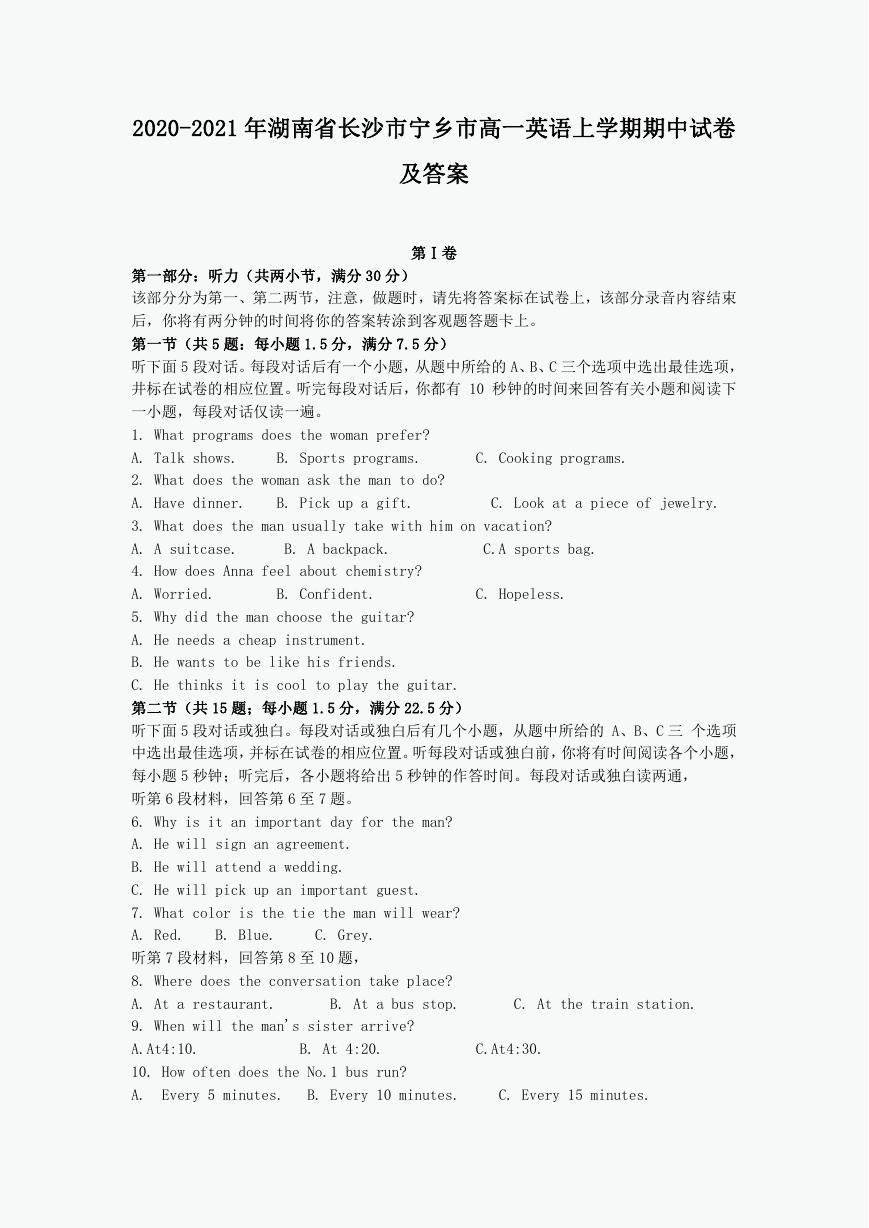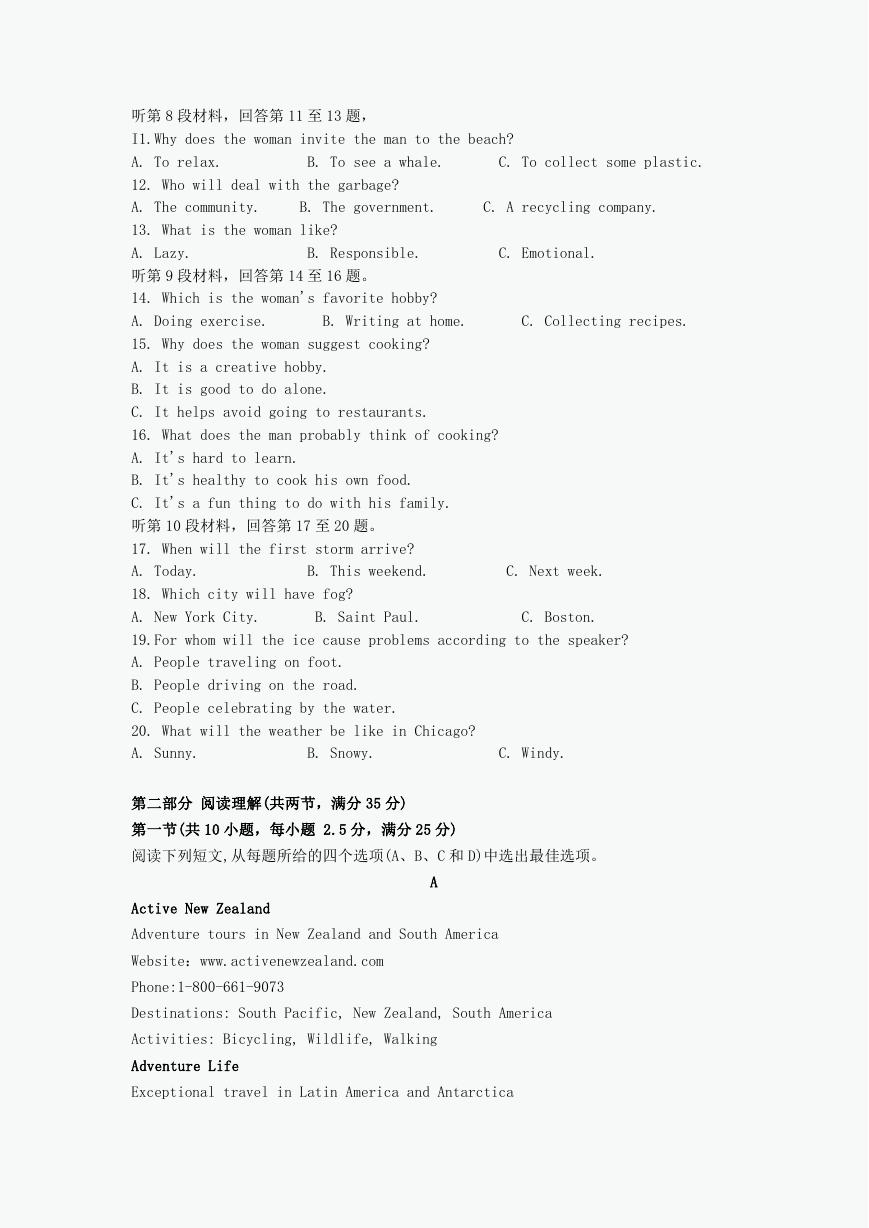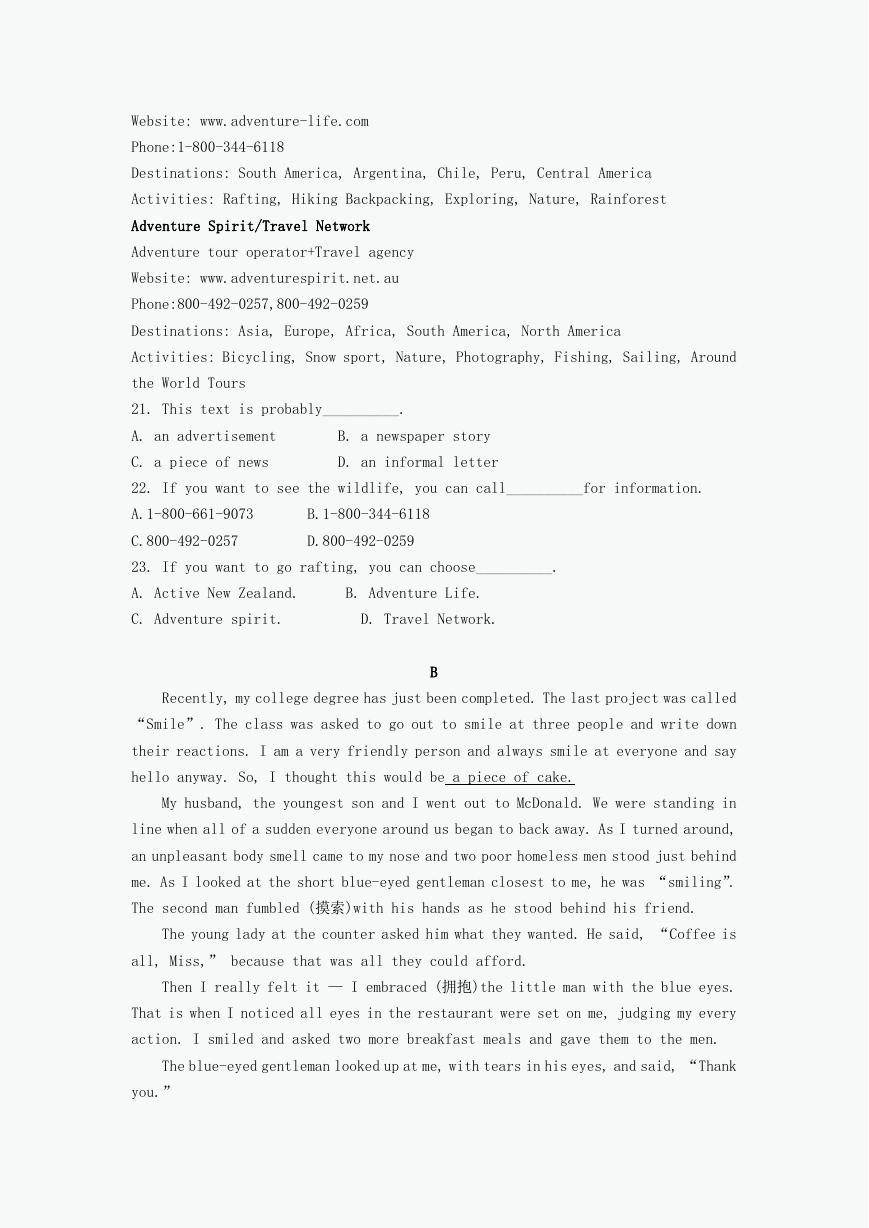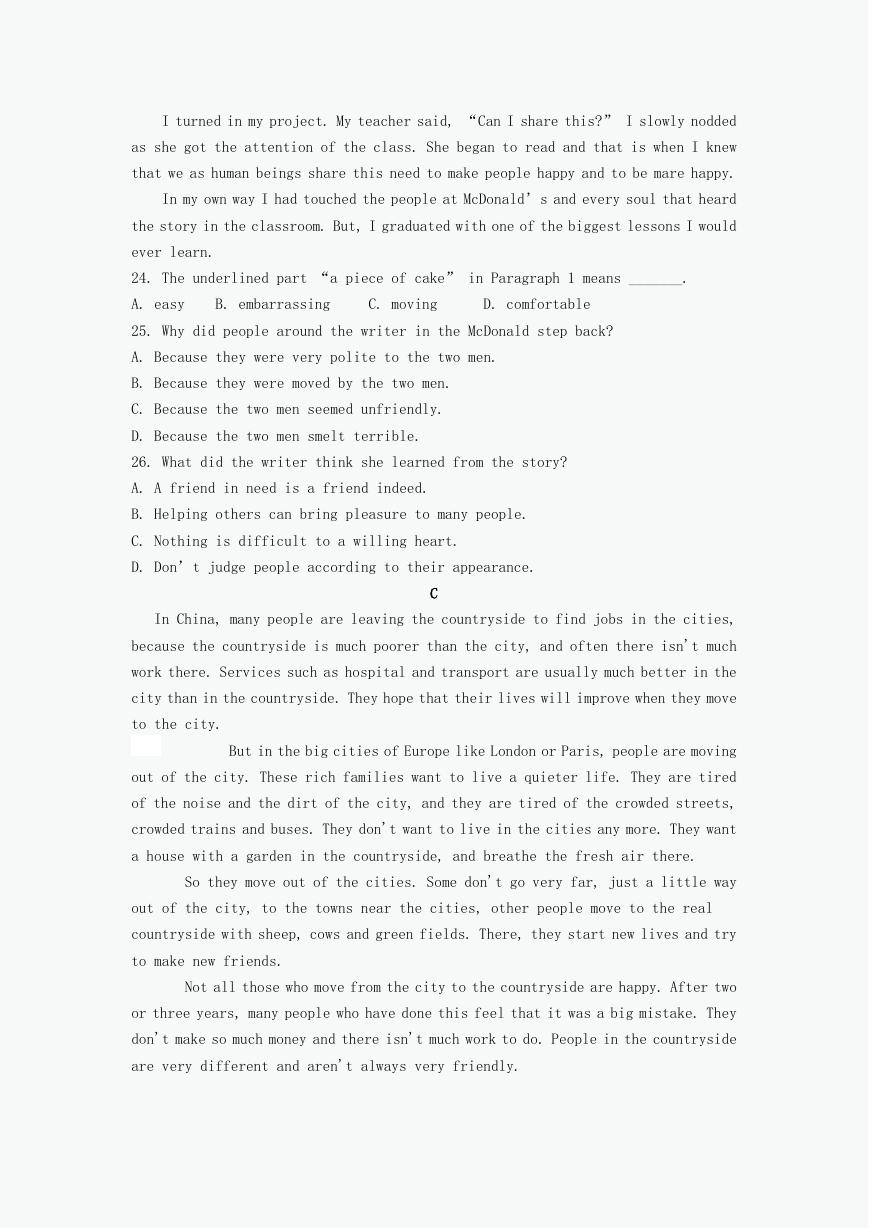2020-2021 年湖南省长沙市宁乡市高一英语上学期期中试卷
及答案
第Ⅰ卷
B. Sports programs.
B. Pick up a gift.
B. Confident.
C. Hopeless.
B. A backpack.
C.A sports bag.
C. Cooking programs.
C. Look at a piece of jewelry.
第一部分:听力(共两小节,满分 30 分)
该部分分为第一、第二两节,注意,做题时,请先将答案标在试卷上,该部分录音内容结束
后,你将有两分钟的时间将你的答案转涂到客观题答题卡上。
第一节(共 5 题:每小题 1.5 分,满分 7.5 分)
听下面 5 段对话。每段对话后有一个小题,从题中所给的 A、B、C 三个选项中选出最佳选项,
井标在试卷的相应位置。听完每段对话后,你都有 10 秒钟的时间来回答有关小题和阅读下
一小题,每段对话仅读一遍。
1. What programs does the woman prefer?
A. Talk shows.
2. What does the woman ask the man to do?
A. Have dinner.
3. What does the man usually take with him on vacation?
A. A suitcase.
4. How does Anna feel about chemistry?
A. Worried.
5. Why did the man choose the guitar?
A. He needs a cheap instrument.
B. He wants to be like his friends.
C. He thinks it is cool to play the guitar.
第二节(共 15 题;每小题 1.5 分,满分 22.5 分)
听下面 5 段对话或独白。每段对话或独白后有几个小题,从题中所给的 A、B、C 三 个选项
中选出最佳选项,并标在试卷的相应位置。听每段对话或独白前,你将有时间阅读各个小题,
每小题 5 秒钟;听完后,各小题将给出 5 秒钟的作答时间。每段对话或独白读两通,
听第 6 段材料,回答第 6 至 7 题。
6. Why is it an important day for the man?
A. He will sign an agreement.
B. He will attend a wedding.
C. He will pick up an important guest.
7. What color is the tie the man will wear?
A. Red.
听第 7 段材料,回答第 8 至 10 题,
8. Where does the conversation take place?
A. At a restaurant.
B. At a bus stop.
9. When will the man's sister arrive?
A.At4:10.
10. How often does the No.1 bus run?
A.
C. At the train station.
Every 5 minutes.
B. Every 10 minutes.
C. Every 15 minutes.
B. Blue.
C. Grey.
B. At 4:20.
C.At4:30.
�
C. To collect some plastic.
B. The government.
C. A recycling company.
C. Emotional.
C. Collecting recipes.
B. Responsible.
B. To see a whale.
B. Writing at home.
听第 8 段材料,回答第 11 至 13 题,
I1.Why does the woman invite the man to the beach?
A. To relax.
12. Who will deal with the garbage?
A. The community.
13. What is the woman like?
A. Lazy.
听第 9 段材料,回答第 14 至 16 题。
14. Which is the woman's favorite hobby?
A. Doing exercise.
15. Why does the woman suggest cooking?
A. It is a creative hobby.
B. It is good to do alone.
C. It helps avoid going to restaurants.
16. What does the man probably think of cooking?
A. It's hard to learn.
B. It's healthy to cook his own food.
C. It's a fun thing to do with his family.
听第 10 段材料,回答第 17 至 20 题。
17. When will the first storm arrive?
A. Today.
18. Which city will have fog?
A. New York City.
19.For whom will the ice cause problems according to the speaker?
A. People traveling on foot.
B. People driving on the road.
C. People celebrating by the water.
20. What will the weather be like in Chicago?
A. Sunny.
B. This weekend.
C. Next week.
B. Saint Paul.
C. Boston.
B. Snowy.
C. Windy.
第二部分 阅读理解(共两节,满分 35 分)
第一节(共 10 小题,每小题 2.5 分,满分 25 分)
阅读下列短文,从每题所给的四个选项(A、B、C 和 D)中选出最佳选项。
A
Active New Zealand
Adventure tours in New Zealand and South America
Website:www.activenewzealand.com
Phone:1-800-661-9073
Destinations: South Pacific, New Zealand, South America
Activities: Bicycling, Wildlife, Walking
Adventure Life
Exceptional travel in Latin America and Antarctica
�
Website: www.adventure-life.com
Phone:1-800-344-6118
Destinations: South America, Argentina, Chile, Peru, Central America
Activities: Rafting, Hiking Backpacking, Exploring, Nature, Rainforest
Adventure Spirit/Travel Network
Adventure tour operator+Travel agency
Website: www.adventurespirit.net.au
Phone:800-492-0257,800-492-0259
Destinations: Asia, Europe, Africa, South America, North America
Activities: Bicycling, Snow sport, Nature, Photography, Fishing, Sailing, Around
the World Tours
21. This text is probably__________.
A. an advertisement
B. a newspaper story
C. a piece of news
D. an informal letter
22. If you want to see the wildlife, you can call__________for information.
A.1-800-661-9073
B.1-800-344-6118
C.800-492-0257
D.800-492-0259
23. If you want to go rafting, you can choose__________.
A. Active New Zealand.
B. Adventure Life.
C. Adventure spirit.
D. Travel Network.
B
Recently, my college degree has just been completed. The last project was called
“Smile”. The class was asked to go out to smile at three people and write down
their reactions. I am a very friendly person and always smile at everyone and say
hello anyway. So, I thought this would be a piece of cake.
My husband, the youngest son and I went out to McDonald. We were standing in
line when all of a sudden everyone around us began to back away. As I turned around,
an unpleasant body smell came to my nose and two poor homeless men stood just behind
me. As I looked at the short blue-eyed gentleman closest to me, he was “smiling”.
The second man fumbled (摸索)with his hands as he stood behind his friend.
The young lady at the counter asked him what they wanted. He said, “Coffee is
all, Miss,” because that was all they could afford.
Then I really felt it — I embraced (拥抱)the little man with the blue eyes.
That is when I noticed all eyes in the restaurant were set on me, judging my every
action. I smiled and asked two more breakfast meals and gave them to the men.
The blue-eyed gentleman looked up at me, with tears in his eyes, and said, “Thank
you.”
�
I turned in my project. My teacher said, “Can I share this?” I slowly nodded
as she got the attention of the class. She began to read and that is when I knew
that we as human beings share this need to make people happy and to be mare happy.
In my own way I had touched the people at McDonald’s and every soul that heard
the story in the classroom. But, I graduated with one of the biggest lessons I would
ever learn.
24. The underlined part “a piece of cake” in Paragraph 1 means _______.
A. easy
B. embarrassing
C. moving
D. comfortable
25. Why did people around the writer in the McDonald step back?
A. Because they were very polite to the two men.
B. Because they were moved by the two men.
C. Because the two men seemed unfriendly.
D. Because the two men smelt terrible.
26. What did the writer think she learned from the story?
A. A friend in need is a friend indeed.
B. Helping others can bring pleasure to many people.
C. Nothing is difficult to a willing heart.
D. Don’t judge people according to their appearance.
C
In China, many people are leaving the countryside to find jobs in the cities,
because the countryside is much poorer than the city, and often there isn't much
work there. Services such as hospital and transport are usually much better in the
city than in the countryside. They hope that their lives will improve when they move
to the city.
But in the big cities of Europe like London or Paris, people are moving
out of the city. These rich families want to live a quieter life. They are tired
of the noise and the dirt of the city, and they are tired of the crowded streets,
crowded trains and buses. They don't want to live in the cities any more. They want
a house with a garden in the countryside, and breathe the fresh air there.
So they move out of the cities. Some don't go very far, just a little way
out of the city, to the towns near the cities, other people move to the real
countryside with sheep, cows and green fields. There, they start new lives and try
to make new friends.
Not all those who move from the city to the countryside are happy. After two
or three years, many people who have done this feel that it was a big mistake. They
don't make so much money and there isn't much work to do. People in the countryside
are very different and aren't always very friendly.
�
As a result, quite a lot of people who have moved to the countryside move
back to the city. "It's wonderful to see crowds in the streets and cinema lights,"
they say.
27. Which is NOT the reason for people moving to the cities in China?
A.The countryside is much poorer than me city.
B.People in the countryside have nothing to eat.
C.People in the countryside don't have much work to do there.
D.Services in cities are usually much better than those in the countryside.
28. Why do some rich families in Europe move to the countryside?
A.Because they will find good jobs.
B.Because they are tired of living in the city.
C.Because they can make more money there.
D.Because they like feeding sheep and cows in the green fields.
29.
The underlined sentence in the last paragraph shows __________
A.they are happy to move back to the city
B.they miss their friends in the countryside
C.they still want to move to the countryside
D.they are tired of the noise and the crowded streets in the city
30. The best title of this passage may be “__________”
A.A happy life!
in the city!
B.Living
C. Moving out or moving back?
D.Living in the
countryside!
第二节 (共 5 小题;每小题 2 分,共 10 分)
根据短文内容,从短文后的选项中选出能填入空白处的最佳选项。选项中有两项为多余选项。
While people in both England and the U.S. speak English, the two types of English
can be very different.
First, there are differences in spelling. The British like the letter “u” and
have kept it in many words. 31.________ Somewhere in our language history, we decided
that “labor”, “color” and “favorite” were just fine without the “u” next
to the “o”.
32.________ Sometimes, we use totally different words. Here, we
live in apartments with elevators. Over there, they live in flats with lifts. We
power our cars with gas. They use petrol. And, if we need to look in our car’s dark
trunk for something, we use a flashlight. They would use a torch to search their
dark boot.
33.________Some British and American idioms have the same meaning, but use
different words. For example, in the U. S. if you want to add your opinion to a
conversation, you put in your two cents.In the U.K., they put in their two pence.
�
Make sense. They have pence and we don’t. Finally, a familiar word used by both
countries but in different ways is “cheers”. We use the word over drinks when we
are wishing someone good health or congratulating on success. The British use
“cheers” to mean “thank you.” 34._________
Now, we don’t expect you to pick sides. 35._______
A. The usage of the word comes from America.
B. For that, we Americans say, “Thank you!”
C. American English will be used more often than British English.
D. Americans have dropped it.
E. Then there are idioms.
F. Both American and British English have their strong points.
G. But our differences go beyond spelling.
第三部分:英语知识运用(共二节;满分 45 分)
第一节:完型填空(共 20 小题;每小题 1.5 分,满分 30 分)
阅读下面短文,从短文后各题所给的四个选项﹙A、B、C 和 D﹚中,选出可以填入空白处
的最佳选项。
On my first day of the sixth grade, I noticed one little girl called Amy on the
school bus. “Don’t 36._____ her,” Lauren said, who sat beside me. “Or they will
make fun of you.”
Amy had many 37._____ differences — lots of reasons for other kids to make fun
of her. Her eyes weren’t straight. Her glasses were an inch thick. And she had really
ugly teeth.
Every day 38.______ we drove to and from school, kids would shout insults (侮
辱) at Amy. “God, what a (n) 39.______ face! Stop looking at me!” “Mr. Rolland
(the driver)! Amy took off her 40._____, and now her eyes are 41.______ me! Make
her put them back on!” For a while I shouted my share of insults, just so I would
fit in (合群). 42._____, I didn’t want them to treat me the same way they treated
Amy.
But while I was insulting her, my heart 43._____ for the girl. I could see that
the insults were making her look 44.______, because she was so ashamed (羞愧) and
alone. Then I wanted to 45.____ her. I just didn’t know how to stop my schoolmates
46._____ the night of our class roller-skating party.
Our whole class was there, including Amy. Amy didn’t know how to 47._____, but
I could see how much she wanted to 48.______ like the rest of us. So I skated over
to her and took her by the hand; we began the journey together around the skating
rink (溜冰场). She just smiled, and sometimes she would laugh in 49._____.
�
On the school bus the next morning there was much news about Amy and me 50._____
together, 51._____ nobody insulted her or me. And they didn’t do that for the rest
of the year. After graduation, I never 52.____ Amy again. However, I never forget
her and I have always 53._____ if I changed her life for the better. But I know for
sure she changed my54.______. After becoming her friend, I no longer tried to impress
(给……留下印象) people by trying to 55._____ like them. I became myself.
36. A. laugh at
B. ask about
C. talk to
D. be afraid of
37. A. common
B. small
38. A. as
B. though
C. social
C. after
D. physical
D. before
39. A. pretty
B. strange
C. ordinary
D. lovely
40. A. glasses
B. coat
C. shoes
D. hat
41. A. frightening
B. interesting
C. encouraging
D. injuring
42. A. Instead
B. After all
C. If so
D. Therefore
43. A. beat
B. lost
C. ached
D. opened
44. A. happier
B. taller
C. prettier
D. uglier
45. A. give into
B. deal with
C. stand up for
D. believe in
46. A. until
47. A. stand
B. except
B. skate
C. before
D. after
C. play
D. walk
48. A. catch up
B. have fun
C. sit down
D. fall over
49. A. fear
B. surprise
C. comfort
D. joy
50. A. talking
B. chatting
C. skating
D. travelling
51. A. so
B. because
C. but
D. still
52. A. wrote to
B. laughed at
C. heard from
D. made fun of
53. A. hoped
B. wondered
C. thought
D. considered
54. A. life
55. A. study
B. mind
B. fight
C. interest
D. friend
C. act
D. play
第二节:(共 10 小题,每小题 1.5 分,共 15 分)
第Ⅱ卷
阅读下面材料,在空白处填入适当的内容(一个单词)或括号内单词的正确形式。
All through history, people from different countries and cultures have lived
of both grammar and vocabulary these
( confuse)
together in Britain. English is made 56.
people brought to Britain. That is why English has so many57.
rules.
Germanic
Before the middle of the 5th century, people in Britain all spoke Celtic. Then
Angles
the
is very different
two
Saxons58._________ (occupy) Britain. Old English,59.
from the English we speak nowadays, consisted of a mixture of their languages.
mainland--the
and
groups
from
the
European
Middle English was used from around the 12th to the 15th century. Many things,
�
60._________(especial) the Norman Conquest, contributed to the development of this
new type of English. After the Norman Conquest, high-class people spoke French
61._________ common people spoke English. In 1399, HenryⅣ became king of England,
and he used English for all official events.
Modern English appeared during the Renaissance in the 16th century. It went through
(change) during this period. However, this was not the end of the
huge 62.
this process
changes in 63.
will continue. The question of whether English will keep changing in the future is
easy 65._________(answer).
English language. It is certain 64.
第四部分:书面表达 (满分 40 分)
第一节:应用文写作(满分 25 分)
假如你是李华。你的美国朋友 Alex 来信说,考试临近时,他总会感到焦虑。请你给他回信。
内容:
1.向 Alex 表示问候和安慰。
2.提出建议。
注意:
1.词数 80 左右;
2.可适当增加细节,以使行文连贯。
Dear Alex,
Yours sincerely,
Li Hua
第二节 读后续写(满分 15 分)
阅读下面材料,根据其内容和所给段落开头语续写两段,使之构成一篇完整的短文。
A man sat on the lawn. a hard cardboard(硬纸板) lying before him, his dog sitting
beside him. On the cardboard it wrote, "I'm in trouble, feeling very hungry and
begging for your help"
I reached into my wallet and took a note of 10 dollars. My 12-year-old son Nick
Immediately knew what I was going to do."Can I bring it to him, Mom?"
I agreed. From the rearview mirror my daughter Brandy and I watched Nick running
quickly to the stranger and gave him the money with a shy smile. I saw the man was
�
















 2023年江西萍乡中考道德与法治真题及答案.doc
2023年江西萍乡中考道德与法治真题及答案.doc 2012年重庆南川中考生物真题及答案.doc
2012年重庆南川中考生物真题及答案.doc 2013年江西师范大学地理学综合及文艺理论基础考研真题.doc
2013年江西师范大学地理学综合及文艺理论基础考研真题.doc 2020年四川甘孜小升初语文真题及答案I卷.doc
2020年四川甘孜小升初语文真题及答案I卷.doc 2020年注册岩土工程师专业基础考试真题及答案.doc
2020年注册岩土工程师专业基础考试真题及答案.doc 2023-2024学年福建省厦门市九年级上学期数学月考试题及答案.doc
2023-2024学年福建省厦门市九年级上学期数学月考试题及答案.doc 2021-2022学年辽宁省沈阳市大东区九年级上学期语文期末试题及答案.doc
2021-2022学年辽宁省沈阳市大东区九年级上学期语文期末试题及答案.doc 2022-2023学年北京东城区初三第一学期物理期末试卷及答案.doc
2022-2023学年北京东城区初三第一学期物理期末试卷及答案.doc 2018上半年江西教师资格初中地理学科知识与教学能力真题及答案.doc
2018上半年江西教师资格初中地理学科知识与教学能力真题及答案.doc 2012年河北国家公务员申论考试真题及答案-省级.doc
2012年河北国家公务员申论考试真题及答案-省级.doc 2020-2021学年江苏省扬州市江都区邵樊片九年级上学期数学第一次质量检测试题及答案.doc
2020-2021学年江苏省扬州市江都区邵樊片九年级上学期数学第一次质量检测试题及答案.doc 2022下半年黑龙江教师资格证中学综合素质真题及答案.doc
2022下半年黑龙江教师资格证中学综合素质真题及答案.doc